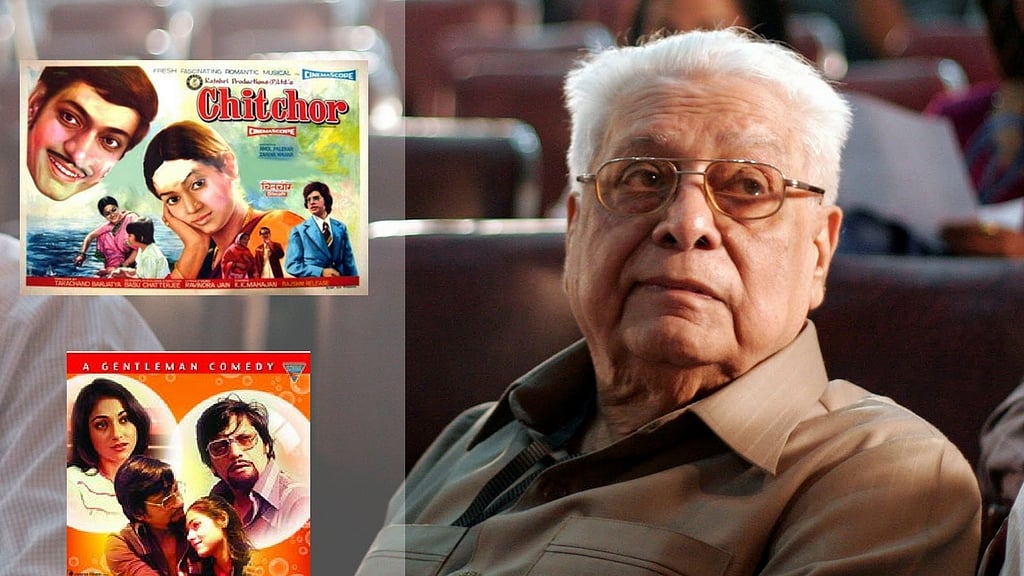Basu Chatterji: The Forgotten Champion of Middle-Class Cinema
The legendary filmmaker Basu Chatterji is now forgetful and also forgotten.

advertisement
He’s getting forgetful, doesn’t move out of his first-storey apartment in Violet Villa located in a leafier lane of Mumbai’s Santa Cruz. He can walk with a bit of support, recognises his family members and domestic helps. “But if he looks at you blankly when you visit,” says his daughter TV content producer Rupali Guha, “please don’t take it amiss. He doesn’t have Alzheimer’s, it’s just that he can’t always place faces, and has even forgotten some of his films.”
The daughter of the 87-year-old film auteur continues, “Like the other day, he saw posters of Chakravyuha (a thriller toplining Rajesh Khanna) and Safed Jhooth (a low-key comedy featuring Vinod Mehra-Amol Palekar-Vidya Sinha) and asked, ‘Did I make those films? What are those posters doing here?’ It’s his advancing age, he keeps to himself.”
Just a couple of years ago Basu Chatterji (he preferred to spell the surname with an ‘i’ instead of the customary ‘ee’) was itching to make yet another shoestring-budget film, soon after Prateeksha with Jimmy Sheirgill and Dia Mirza, seen only on Sahara TV channel, which had commissioned the project. A screenplay draft of The Window, a take on the rising spectre of communalism, alas found no takers.
Restless to stay with the camera, he’d take off to Kolkata to confect a Bengali film or two which required neither outlandish finance nor brain-curdling plots. Age no bar, he wished to tell countless stories – about the people he knows best – the middle-class buffeted by plausible crises which are overcome with honesty and humour.
No French-bearded baddies, cigarillo-puffing vamps and stunt-addicted superheroes mar his considerable oeuvre of over 40 feature films, a bunch of them in Bengali, not to forget those vintage, trend-setting TV series: Rajani (1985) showcasing the late Priya Tendulkar as a firebrand housewife and Byomkesh Bakshi (1983) following the adventures of a Sherlock Holmes-like sleuth.
Kitted in a navy blue lungi, bare-chested (unless an unfamiliar visitor was expected) and enjoying his evening quota of Scotches (“Yeh single malt valt I don’t like”), he couldn’t entertain the notion of retirement.
Basuda had shrugged in his study equipped with a state-of-the-art computer. “Since no financier seems interested in my kind of films anymore, I surf the internet. There’s so much going on.”
On the frontline of the film society movement from the mid-1960s onwards, Basuda could surely expound on myriad subjects. Initially, he was the illustrator-and-cartoonist of the tabloid Blitz. Moreover, he had edited the seminal magazine Close-Up, dedicated to in-depth criticism.
To that, he retorted, “There was a time when cartooning didn’t have to follow a publication’s political stance. It was also a time to crusade for better cinema by exposing people to world cinema. Screenings of short films from the Oberhausen festival in Germany, a collection of Czech films and the French new wave masterpieces were jam-packed and influenced major Indian film directors. That era has gone. Today, it’s the era of downloading films from any part of the world. Cineastes don’t travel miles to see masterworks anymore – like they would for the morning shows of Satyajit Ray films at the Chitra cinema in Mumbai.”
While spearheading the Film Forum Society along with the late Arun Kaul, Chatterji began working on his debut black-and-white film Sara Akash (1969). The study of a young man’s resistance to an arranged marriage attracted praise from the mandarins.
Next, in 1975-‘76 Chitchor and Chhoti Si Baat once again sided with the awkward simpleton over the suave man-about-town. Intermittently, Basuda did take on more on his plate than he could chew, resulting in the disappointing Us Paar, Tumhare Liye, Do Ladke Dono Kadke to cite random examples. Yet after the downers, the writer-director bounced back with Khatta Meetha, Baton Baton Mein, Swami, Apne Paraye and Shaukeen.
On being asked about the film closest to his heart, the response was: Jeena Yahan (1979), a barely remembered reflection on a young couple’s adjustment to urban pressures, including daily commuting and housing issues.
That didn’t happen. Today Basu Chatterji has become forgetful and long forgotten by the movers and shakers of Bollywood.
(The writer is a film critic, filmmaker, theatre director and weekend painter.)